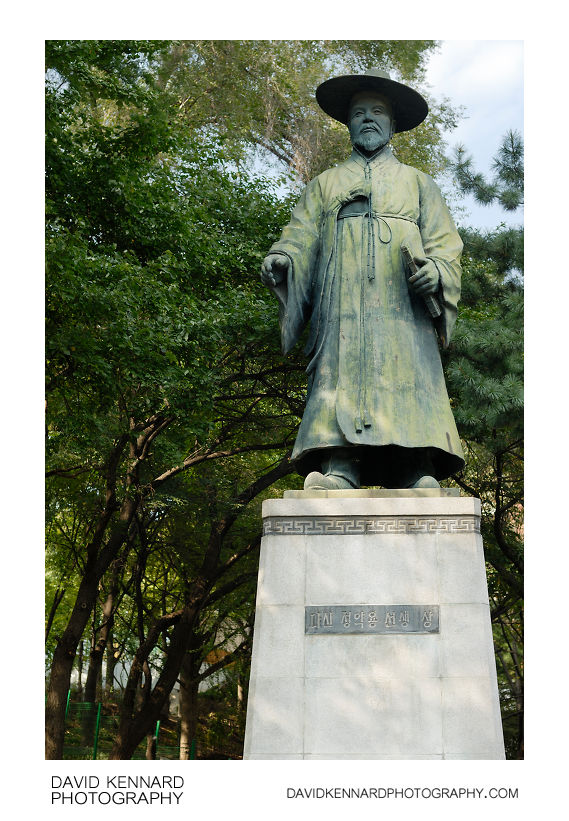Jeong Yak-yong statue

Description
- Title:
- Jeong Yak-yong statue
- Caption / Description:
-
A statue of Jeong Yak-yong (정약용) near Namsan Library (남산도서관), in Huam-dong (후암동), Yongsan-gu (용산구), Seoul (서울). The statue was errected on October 20, 1970, along with a statue of Yi Hwang (이황), and stands at a height of 6.5 metres.
Jeong Yak-yong was a Confucian scholar in the late Joseon Dynasty. He argued that scholarship should not be focused on philosophical theory, but rather practical concerns.
Jeong Yak-yong was born in Namyangju City (남양주시), in Gyeonggi-do (경기도) Province in 1762. He served in the government in a variety of roles during his life, including as a secret royal inspector (암행어사), where he uncovered corrupt government officials.
One of the earliest Korean converts to Catholicism, this caused problems for Jeong Yak-yong in his govermental position. After the death of King Jeongjo (정조) in 1800, Jeong Yak-yong was exiled to Gangjin county (강진군) in the south of the country. While in exile he taught others, exchanged ideas with buddhist monks, studied, and wrote many works.
King Sunjo (순조) granted Jeong Yak-yong a pardon in 1819. After Jeong's death in 1836, he was given the posthumous name of Mundo (문도) by King Heonjong (헌종). 'Mun' refers to writing or literature, and 'do' to law.
- Tags / Keywords:
-
- Stone
- Statue
- Memorial
- Monument
- Bronze
- Asia
- 한국
- Hanguk
- 韓國
- Korea
- Seoul Special City
- Seoul Teukbyeolsi
- 서울特別市
- 서울특별시
- Namsan
- 남산
- 南山
- Huam-dong
- Yongsan-gu
- 용산구
- 龍山區
- Jeong Yak-yong
- Chŏng Yagyong
- 정약용
- 丁若鏞
- Dasan
- Tasan
- 다산
- 茶山
- Miyong
- 미용
- 美鏞
- Songbo
- 송보
- 頌甫
- Sammi
- 삼미
- 三眉
- Yeoyudang
- 여유당
- 與猶堂
- Saam
- 사암
- 俟菴
- Jahadoin
- 자하도인
- 紫霞道人
- Tagong
- 탁옹
- 籜翁
- Taesu
- 태수
- 苔叟
- Munamirin
- 문암일인
- 門巖逸人
- Cheolmasancho
- 철마산초
- 鐵馬山樵
- Gwinong
- 귀농
- 歸農
- John
- Yohan
- 요한
- Mundo
- 문도
- 文度
- Namsan Library
- 남산도서관
- 후암동
- 厚岩洞
Admin
- Date Original Photo Taken:
- Original File Name:
- Jeong Yak-yong statue.psd
- Event:
- Rating:
- ☆
- Date this image added/last updated on website:
- Original File Dimensions:
- 2544px x 3821px
- File Type:
- JPEG
- Color Mode:
- RGB
- Original Image Color Profile:
- Nikon Adobe RGB 4.0.0.3001
Location
- Location Shown:
-
- Sublocation:
- Huam-dong
- City:
- Yongsan-gu
- Province/State:
- Seoul
- Country:
- Korea, Republic Of
- World Region:
- Asia
- Location Created:
-
- Sublocation:
- Huam-dong
- City:
- Yongsan-gu
- Province/State:
- Seoul
- Country:
- Korea, Republic Of
- World Region:
- Asia
- Geo-location:
- 37.552303135556, 126.98106322028 View on map
Rights
- Copyright Status:
- Copyrighted
- Licensing Status:
- Rights Managed
- Available for Editorial Use:
- Yes
- Available for Commercial Use:
- No
- Copyright Notice:
- © 2009 Dave Kennard
Camera Data
- Date Digital Resource was created:
- Shutter speed:
- 1⁄200 s
- Aperture:
- f/4
- Camera Model:
- Nikon D200
- ISO:
- 100
- Exposure Compensation:
- 0
- Focal Length:
- 50mm
- Focal Length (35mm equiv.):
- 75mm
- Metering Mode:
- Multi-segment
- Flash:
- No Flash
- Exposure Mode:
- Auto
- White Balance:
- Manual
- Light Source:
- Cloudy
- Exposure Program:
- Aperture-priority AE
Additional shooting metadata
- Lens:
- Nikon AF Nikkor 50mm F1.4D
- Filters used:
- Additional Optics used:
- Setup:
- Handheld, bracketed ±1EV
Post Processing
- Image Modified:
- Software used:
-
- Adobe Photoshop CS4
- Nikon Capture NX 2
- Post Processing:
NEFs converted in Capture NX 2
Exposures blended in Photoshop CS4
Curves adjustment selectively applied in Photoshop CS4 to increase contrast
Straightened in Photoshop CS4
